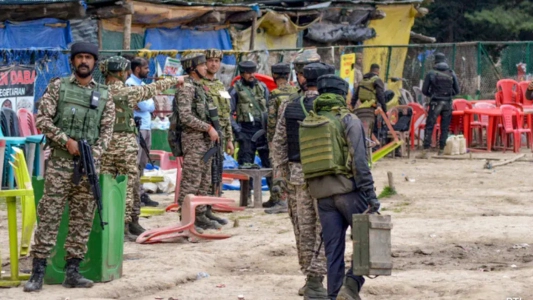Table of Contents
Pahalgam, Jammu & Kashmir – April 30, 2025
In a tragic turn of events, India is grappling with the aftermath of a devastating terror attack in Pahalgam, Jammu & Kashmir, which claimed the lives of 26 individuals, predominantly Hindu tourists, and left over a dozen injured. The incident has not only plunged the nation into mourning but has also intensified tensions between India and Pakistan, with both nations engaging in a series of retaliatory measures.
The Attack and Immediate Aftermath
On April 22, 2025, armed militants launched a brutal assault on a group of tourists in the Baisaran meadow near Pahalgam. Eyewitnesses reported that the assailants emerged from nearby forests, indiscriminately opening fire on the unsuspecting visitors. A particularly harrowing video surfaced, capturing a tourist ziplining over the valley, oblivious to the carnage unfolding below.
Indian authorities have identified three key perpetrators: Lashkar-e-Taiba chief Hafeez Saeed, his deputy Saifullah Kasuri—both believed to be in Pakistan—and Hashim Moosa, a former Pakistani commando currently at large in Jammu & Kashmir.
India’s Response
In the wake of the attack, Prime Minister Narendra Modi convened a high-level meeting of the Cabinet Committee on Political Affairs, granting the armed forces autonomy to determine the timing and nature of India’s response.
Security measures have been ramped up across the region. Over half of the government-authorized tourist resorts in Kashmir have been closed as a precautionary step. Additionally, a massive crackdown has led to the detention of nearly 2,000 individuals, with authorities demolishing homes of suspected militants.
Escalation Along the Borders
The situation has further deteriorated with Pakistan’s military initiating unprovoked firing across the International Border in Jammu and Kashmir’s Pargawal sector, extending beyond the traditional Line of Control. This marks the sixth consecutive day of ceasefire violations, with reports of small arms fire in multiple sectors.
In retaliation, India has suspended the Indus Waters Treaty, a longstanding agreement on water-sharing between the two nations. Pakistan, on its part, has closed its airspace to Indian airlines, further straining diplomatic ties.
International Reactions
The international community has expressed deep concern over the escalating tensions. The United Nations, the United States, and the United Kingdom have all called for restraint and urged both nations to engage in dialogue to prevent further escalation.
Notably, the attack coincided with a visit by U.S. Vice President JD Vance to India. Both he and President Donald Trump have condemned the attack, offering condolences and affirming support for India’s fight against terrorism.
Impact on Kashmir’s Tourism and Local Sentiments
The attack has dealt a severe blow to Kashmir’s tourism industry, which had been witnessing a resurgence. With over a million cancellations reported, the economic ramifications are significant.
Locally, while there’s widespread condemnation of the attack, there’s also growing apprehension about the sweeping security measures. Residents express concerns over potential civil liberties violations, fearing that the aggressive crackdown might alienate the local populace.
Looking Ahead
As the nation mourns the loss of innocent lives, the government’s focus remains on ensuring security and bringing the perpetrators to justice. However, the path forward requires a delicate balance between decisive action and measured diplomacy to prevent further escalation and ensure lasting peace in the region.
Stay informed with The Instant News – your trusted source for real-time updates and in-depth analysis.


